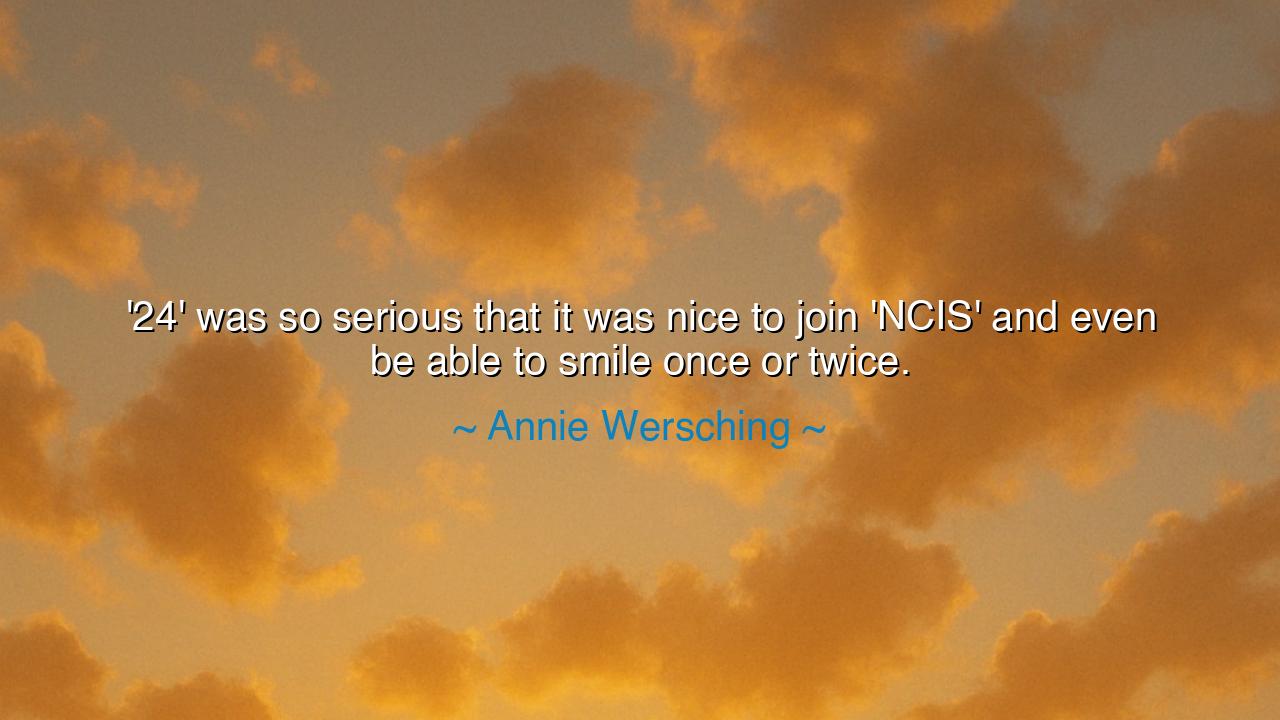
'24' was so serious that it was nice to join 'NCIS' and even be
'24' was so serious that it was nice to join 'NCIS' and even be able to smile once or twice.






Hear now the words of Annie Wersching, whose life upon the stage of television was woven with roles of gravity and of light: “‘24’ was so serious that it was nice to join ‘NCIS’ and even be able to smile once or twice.” At first, these words may seem as the simple musings of an actress reflecting on her craft, yet within them lies a timeless teaching: that life must be balanced, that even amidst severity there must be room for joy, and that the smile—small though it may be—has the power to restore the spirit.
The meaning of this truth lies in the recognition that human beings cannot dwell forever in the shadow of intensity. On 24, Annie walked in a world of tension, danger, and unyielding seriousness. Such weight, even when only performed, leaves its mark upon the soul. Thus, her joy in entering the world of NCIS was not trivial but profound: it was the relief of a spirit allowed once more to breathe, to smile, and to partake in the lighter shades of humanity. For just as night must be followed by dawn, so too must the sternness of duty be balanced by moments of laughter.
History itself offers many echoes of this lesson. Recall Winston Churchill, who in the midst of the Second World War bore the heaviest burdens of state. Yet it is recorded that he often delighted in humor, in painting, in lighthearted moments with friends. He knew that to carry only the gravity of war would break even the strongest heart. His smiles in private were not betrayals of the struggle, but renewals of strength. Just as Annie found relief in the lighter atmosphere of NCIS, Churchill found endurance through moments of joy amidst darkness.
The smile itself is here a symbol of balance. To smile “once or twice” may seem a small thing, but it is a sign that joy has not been extinguished. In the theater of life, as on the stage, one cannot forever play the tragic role. The heart longs for levity, for humor, for warmth. Annie’s words remind us that the capacity to shift between seriousness and joy is not weakness, but wisdom—it is what allows the soul to endure without becoming hardened.
And there is humility in her reflection. She does not disdain the seriousness of 24, nor does she treat the lighter spirit of NCIS as lesser. Instead, she honors both, recognizing that each has its season. In this, she teaches us to value all experiences—the weighty and the light—for together they weave the fullness of life. Without gravity, joy becomes frivolous; without joy, gravity becomes unbearable. To live well is to hold both in harmony.
The lesson for us is clear. Do not chain yourself forever to solemnity, nor lose yourself entirely in levity. Seek balance in your labors, remembering that the soul requires both challenge and rest, both struggle and laughter. When life is too heavy, seek moments that make you smile, for they will restore your strength. And when life is too easy, embrace the tasks that demand seriousness, for they will give your days meaning.
Therefore, let each one act thus: honor your responsibilities with gravity, yet cherish your joys with gratitude. When you are burdened by the weight of duty, permit yourself, as Annie did, to smile even once or twice—for that smile will rekindle your spirit. And when laughter finds you, do not dismiss it, for it is as sacred as solemn work.
Thus, the teaching is eternal: Life is a dance between seriousness and joy, and the smile is the bridge between them. To endure with dignity, we must learn, as Annie Wersching knew, to embrace both the weight of responsibility and the lightness of laughter.






AAdministratorAdministrator
Welcome, honored guests. Please leave a comment, we will respond soon